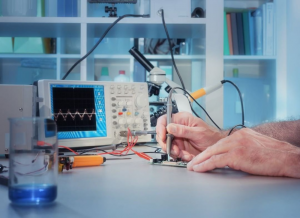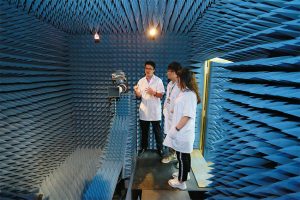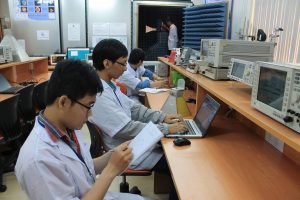Program code: 7520207
The International University – Vietnam National University, Ho Chi Minh City was established in 2003, and the School of Electrical Engineering is one of the first four majors. Oriented to the main goals, vision, and mission of the International University, the main goal of the School of Electrical Engineering is to prepare graduated students with a full package of necessary fundamental knowledge and skills to adapt to the rapidly changing technology world, especially in the fields of Electronics Engineering, Telecommunications Engineering, and Signal and Image Processing.






In particular, the Electronics – Telecommunications Engineering program has been accredited by the ABET (Accreditation Board for Engineering and Technology – USA) starting from the end of 2018.
– Program Educational Objectives:
- Provide a complete knowledge base and skills in the field of Electrical Engineering.
- Serve and respond to industry needs, scientific research, and postgraduate studies.
- Prepare graduates to adapt to rapid changes in the fields of Electrical, Electronics, and Telecommunication.
– Program Orientations:
- Microelectronics and Embedded Systems: Advanced training in the design, manufacture, and application of digital and analog ICs, and microprocessor systems.
- Telecommunication system: In-depth training in the design and operation of high-speed communication systems, data communication networks, mobile networks, the internet, and new technologies on smartphones.
- Signal Processing: training in the design and development of digital video, audio, video, and data processing systems.
- Ultra-High Frequency Circuit Design: Advanced training in the design and development of high-frequency ICs, and ultrasonic devices for radar, wireless communications, satellite, and national defense.
– Career opportunities:
- Work for foreign companies or domestic corporations or companies in the field of IC design, consumer electronics, and information technology.
- Work for corporate communications, information, mobile networks at home and abroad, aviation, and transportation companies.
- Career development at entertainment & advertisement companies.
In addition to the program objectives and career opportunities of each major, students of the Electronics – Telecommunications Engineering program will be provided with the following knowledge, skills, and abilities after graduation:
1. Student Outcomes
Students of the Electronics – Telecommunications Engineering program are prepared with the following knowledge, skills, and abilities:
1.1. The Knowledge of Political Theory
About the Political theory:
- The graduated students have a correct understanding of the Communist Party and the Govermnent’s policies.
- Strictly abide by the laws of the Government and the regulations of the working organizations after graduation.
- Have their respective point of view, while being able to perceive and evaluate different situations logically and positively.
About the Behavior and Ethics:
- Have good personal as well as professional ethics.
- Have a spirit of patriotism, love for other fellow countrymen, attachment, and good community service spirit.
- Have a sense of personal responsibility, as well as a responsibility to the community.
- To be proactive, positive, progressive, and creative at work.
- Have a high spirit and skills of teamwork while maintaining high professionalism.
1.2. Foreign language capability
- The students of the International University, by the time of completing their undergraduate programs, must reach an intermediate-advanced level of English proficiency. The requirement of a minimum English level of 5.5 IELTS or other certificates with equivalent scores, namely: 61 TOEFL iBT, or TOEIC (600 Listening + Reading and 270 Speaking + Writing).
- Senior students must write their respective thesis reports in English, and must successfully defend the thesis project before the Scientific Council of the School of Electrical Engineering.
- Graduated students can participate in dialogues or discussions with a relatively complete vocabulary for all situations, with a relatively good knowledge of English idioms, phrasal verbs, and colloquial words.
- Graduated students should master all areas of English grammar, and be able to present in the form of a thesis report of problems in daily life as well as in academic environments.
1.3 Qualification
After graduation, students of the Electronics and Telecommunications Engineering program must meet the following requirements:
- Ability to apply knowledge of math, science, and engineering.
- Ability to design and practice experiments, as well as analyze and interpret data.
- Ability to design a system, an element, or a process to satisfy given requirements within realistic constraints such as economic, environmental, social, political, ethical, health, and safety constraints.
- Ability to clarify and accurately address and solve problems in electronics and telecommunications engineering fields.
- Ability to implement the skills, techniques, and modern engineering tools required for electrical engineering practice.
- Knowledge of statistics and probabilities, including appropriate applications to the program and objectives of electrical engineering; Knowledge of mathematical concepts through the differential and integral expressions, basic science, computer science, and engineering science required for the analysis and design of complex electrical and electronic devices.
1.4. Ability to work
- Graduated students are able to perform research or management activities with electronic products or IC design projects at domestic and foreign companies.
- Have the ability to operate and develop computer, telecommunications, radio, and television networks.
- Able to work in international telecommunications companies, domestic telecommunications companies, telephone companies, data transmission companies, and securities companies…
- Graduated students can become researchers or lecturers for universities and institutes.
- After graduating from the university, students are fully capable of pursuing higher education at domestic and foreign universities.
2. Lecturers and Researchers
Currently, the School of Electrical Engineering is composed of 19 members, including 1 Associate Professor, 12 Ph.D., and 6 Master of Engineering who are actively teaching courses. The details information about the Lecturers – Researchers, their respective research orientations, and contact information, are provided at the following link:
3. Laboratories
Thanks to investment from the government projects, the World Bank and the International University, the School of Electrical Engineering currently possesses a system of modernized and high-standard laboratories. Currently, the School operates 6 laboratories and 1 mechanical – electrical workshop:
| No. | Laboratories | Location | Area |
| 1 | Advanced RF & Microwave Laboratory | LA2-109 | 90m2 |
| 2 | Electronics Laboratory | LA2-201 | 96m2 |
| 3 | Telecommunication Laboratory | LA2-202 | 96m2 |
| 4 | Signal Processing Laboratory | LA2-207 | 60m2 |
| 5 | Embedded – System Laboratory | LA2-208 | 60m2 |
| 6 | Automation Laboratory | LA2-210 | 60m2 |
| 7 | The workshop | The Aquarium Resources compound | 45m2 |
4. Contact information
School of Electrical Engineering – Office O2.206
Tel: (+84) 283 7244 270 – Ext: 3221
